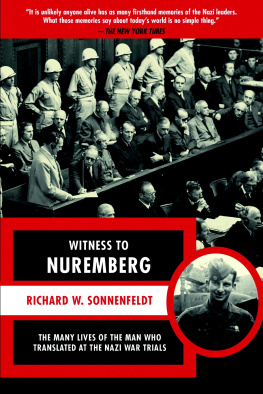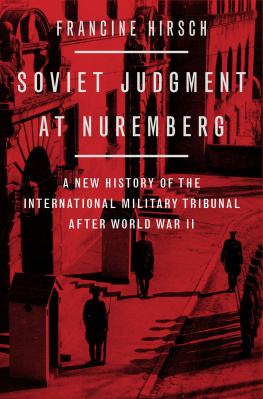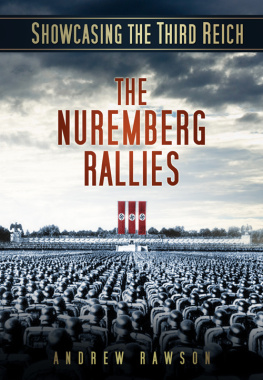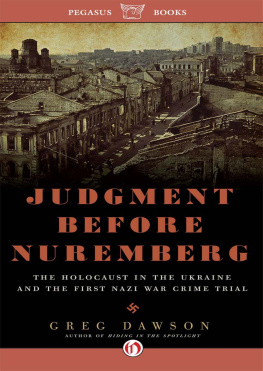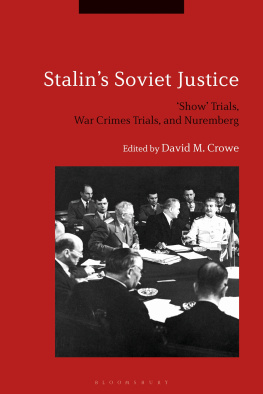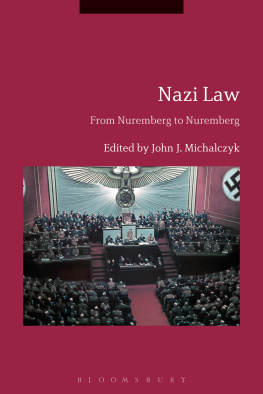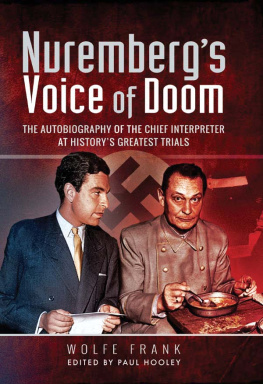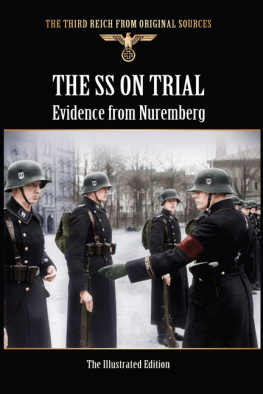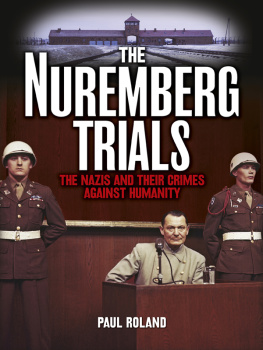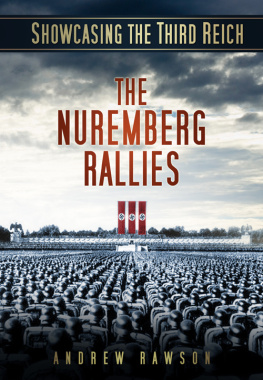Yaroslav Halan - Reports from Nuremberg
Here you can read online Yaroslav Halan - Reports from Nuremberg full text of the book (entire story) in english for free. Download pdf and epub, get meaning, cover and reviews about this ebook. year: 1976, publisher: Dnipro Publishers Kiev, genre: Detective and thriller. Description of the work, (preface) as well as reviews are available. Best literature library LitArk.com created for fans of good reading and offers a wide selection of genres:
Romance novel
Science fiction
Adventure
Detective
Science
History
Home and family
Prose
Art
Politics
Computer
Non-fiction
Religion
Business
Children
Humor
Choose a favorite category and find really read worthwhile books. Enjoy immersion in the world of imagination, feel the emotions of the characters or learn something new for yourself, make an fascinating discovery.

- Book:Reports from Nuremberg
- Author:
- Publisher:Dnipro Publishers Kiev
- Genre:
- Year:1976
- Rating:4 / 5
- Favourites:Add to favourites
- Your mark:
- 80
- 1
- 2
- 3
- 4
- 5
Reports from Nuremberg: summary, description and annotation
We offer to read an annotation, description, summary or preface (depends on what the author of the book "Reports from Nuremberg" wrote himself). If you haven't found the necessary information about the book — write in the comments, we will try to find it.
Reports from Nuremberg — read online for free the complete book (whole text) full work
Below is the text of the book, divided by pages. System saving the place of the last page read, allows you to conveniently read the book "Reports from Nuremberg" online for free, without having to search again every time where you left off. Put a bookmark, and you can go to the page where you finished reading at any time.
Font size:
Interval:
Bookmark:
Reports from Nuremberg
Yaroslav Halan
Dnipro Publishers Kiev 1976
Translated from the Ukrainian by Anatole Bilenko
epub version 1.0
Yaroslav Halan (19021949), the outstanding Soviet-Ukrainian writer, is known to the readers as a brilliant pamphleteer and acute political journalist.
After the outbreak of the Great Patriotic War of 19411945 he soon became a prolific radio commentator. In this field he skillfully applied his knowledge of the history of fascism, especially where it concerned the treason of Hitlers Ukrainian nationalistic agents. He retraced every step of their service to the nazis and exposed to the whole world their atrocities in temporarily occupied Ukraine.
Historical authenticity, profound analysis of social issues, accuracy of presentation, and political foresightedness are among the chief attributes of Halans literary output. During the hardest time for the Soviet people Halan was writing with firm belief about the inevitable failure of fascism. In June 1942, six months before the conclusion of the Battle of Stalingrad, he prophesied in his pamphlet Payment in Advance (included in the present collection), that the leaders of the Third Reich, still at the height of their power, would, nevertheless, soon be brought before the trial of nations, and it will be a trial unprecedented in history.
It was therefore appropriate that Halan, in 19451946, represented the Soviet-Ukrainian press at the Nuremberg trial of the principal war criminals of nazi Germany. At the same time he visited many European countries and noted down his impressions in a whole series of pamphlets and reports dealing with the world struggle against fascism and the danger of a new war. The progeny of fascism has not yet disappeared from the face of the earth, he wrote. The dark forces, which once reared Mussolini and Hitler, are still alive and active And it is the bounden duty of everyone of us to wage a consistent, relentless struggle against reaction In all its forms.
It is to this cause that I have dedicated this modest collection of reports and stories. Written at different times, they nonetheless have one common idea: to bring nearer the day when real freedom becomes the privilege of all mankind.
The reports In the present collection were written thirty years ago, but their message to the modern reader is as relevant as ever.
My acquaintance with fascism started way back in 1923 in the library of Vienna University, when its traditionally solemn silence was interrupted all of a sudden by what sounded like the clattering of hooves of a herd of sluggish Bavarian stallions. A gang of thugs, clutching cudgels in their hands, burst into the reading room without taking off their caps. The cudgels spoke for themselves: they were the symbol, the emblem, the adornment and weapon of the first Austrian supporters of Hitler the students of the College of Agronomy (mostly composed of rich landowners boys).
The leader of the gang, a lanky, red-haired fellow with a pince-nez, shouted in an overstrained falsetto:
Alle Juden mssen heraus!
In a couple of minutes the library hall was empty; in protest against such an outrageous profanation of the alma mater, almost all of those present left.
The would-be SS men did not expect such a turn of events. Pale with rage, they stood silently on either side of the entrance. Then one of them shouted, Give it to them!, and a couple of dozen cudgels swished through the air. The mad rowdies did not spare anyone. Falling down the marble stairway, young men gashed their heads, blood poured down the faces of young women. All this was to the accompaniment of booing, laughing and howling from the exuberant two-legged beasts.
When the last victims head crashed against the banister, the beasts formed fours and marched toward the University in military formation. The aforementioned falsetto shrieked, Wacht am Rhein! and the pack began howling in response.
I shall never forget that Wacht am Rhein.
Some weeks after I had the opportunity of looking into the face of fascism once again, this time at a more advanced stage of its development. The mail ship running from Naples to Palermo came in to the capital of Sicily on the very day elections to the first fascist parliament were being held. It was the same story as in Naples, Rome, Florence and Venice: overhead, garish flags hit your eye, and the walls, fences and telegraph poles were plastered with no less garish posters depicting scantily clad personages who were supposed to look like ancient Romans. There was another peculiar feature to the scene: an unprecedented number of policemen of all types city, military, national. Even the exotic carabinieri walked the streets not in pairs, as they always did, but in whole throngs. It seemed as if all Palermo had donned policemens uniforms for the elections.
There was also commotion at the little hotel in the Quatro Canti were I stayed. I had just had time for a wash, when my room was filled with police and various military types. A portly gentleman wearing civilian clothes asked me for my passport. Upon seeing the word Polonia (Poland) in it, he raised his artily twisted, soot-black moustache and said:
Your passport is forged! Instead of Bologna it has some Polonia written in it.
I dont know what time I had to embark on a lecture in that country to explain that besides the city of Bologna there was a European nation called Poland, when a number of pistol shots rang out below, almost right under the windows. The gentleman dropped on all fours, grew pale and screamed out some sort of command. In a second the whole gang with the gentleman bringing up the rear rushed down the stairs and into the street.
The atmosphere was getting a bit too close; I wanted to get out of town to where there were no police, where the rose-colored 400-meter high slopes of Monte Pelegrino dropped sheer to the bright-blue sea. An hour later I was at the foot of the mountain. From here I could reach its summit by a meandering tourist highway or by a considerably shorter, albeit harder route along the bottom of a deep, stony gully spanned with a network of viaducts. I chose the second route.
The heat was a real torture, the climbing was getting harder with every step. The heat, bouncing back from every rock, made my head ache, I was sweating all over. Only the viaducts provided some patches of shade. I was just about to take a rest under one of them, when something clinked overhead and a pace from where I stood a boulder hit the ground with a dull thud and shattered into little pieces. I raised my eyes. On the viaduct I saw some Black Shirts wearing caps with dangling strings. Some of them were laughing, others whistling or howling like jackals. I recalled the scene on the library steps in Vienna: the dance there had been to the same tune.
But I had no time for reflection. A number of rocks were flying my way, each of them deadly. I just managed to jump under the vault of the viaduct, as it reverberated with the echo of crashing rocks.
When the footsteps overhead died away, I ventured out of my hiding. After walking some hundred paces from the viaduct, I turned round: the Black Shirts were gone. But I noticed something which Mussolinis henchmen had overlooked. Across the whole width of the viaduct there blazed in the sun the large red letters of a militant slogan of the Italian underground: Evviva Lenin! A basso Mussolini! To the people who had written these words, Lenin would always be alive, teaching them to be fearless in unequal battle. The sun had not yet set over Italy
It was in the autumn of 1930 that my native Galicia started to groan under the iron heel of Pisudski. In the streets of Lviv rhythmically swayed the white covers of the police caps, and the hooves of uhlan horses clattered on the cobble, as they marched beyond the city where terrorized villages huddled in the mist of the September nights. For three months the Lviv barracks remained empty, and throughout these three months carts with maimed peasants kept streaming into the city day end night. Since the hospitals did not accept them, they died of gangrene in dark stinking courtyards, in the murk of damp cellars, while their very deaths were branded as illegal.
Next pageFont size:
Interval:
Bookmark:
Similar books «Reports from Nuremberg»
Look at similar books to Reports from Nuremberg. We have selected literature similar in name and meaning in the hope of providing readers with more options to find new, interesting, not yet read works.
Discussion, reviews of the book Reports from Nuremberg and just readers' own opinions. Leave your comments, write what you think about the work, its meaning or the main characters. Specify what exactly you liked and what you didn't like, and why you think so.

